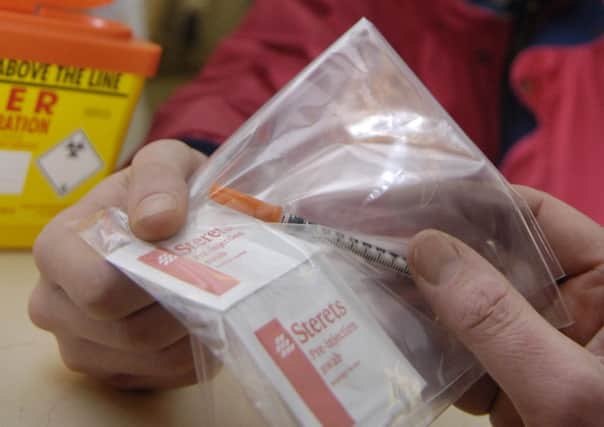Martyn McLaughlin: Network Rail shouldn't meddle with public health policy


It is a curious and worrying situation when a UK government quango tasked with maintaining the nation’s rail network can endanger lives by drastically veering from its remit to meddle with public health policy, but that is precisely the farcical situation that has been brought about by Network Rail’s decision to close down nation’s busiest needle exchange for injecting drug users.
The facility, situated inside Glasgow Central Station, has been a vital resource since it came into operation last July, handing out more than 90 sets of hypodermic needles every day to those caught in the grip of addiction.
Advertisement
Hide AdAdvertisement
Hide AdOver the past 14 months, the facility has become the most frequented exchange in Scotland, if not the UK, with nearly 2,000 people making use of its services, located in a branch of Boots in the station’s main concourse. Nearly every agency and public health expert in the city regarded it as a vital resource, helping to curb the spread of infection amongst a vulnerable demographic.
On Monday however, after less than 24 hours notice, the exchange was unceremoniously wound down, with Network Rail announcing that it would no longer tolerate users leaving behind drug-related paraphernalia in public areas of the station. The haste with which the decision was taken came as a surprise, particularly given Network Rail’s redoubtable track record in delays and cancellations has earned it regulatory fines totally tens of millions of pounds in recent years. When it comes to dirty needles, however, its modus operandi is to act first and think later.
It does not require an expert in addiction to realise the folly of this draconian measure. In any given year, authorities in the city record around 10 new diagnoses of HIV among injecting users. But over the past two-and-a-half years, there have been 90 new cases, with 12 alone in the first six months of this year.
The Central Station needle exchange, introduced largely in response to the escalating HIV rates, was seen as a significant step in the right direction, and its inception was welcomed by, among others, Police Scotland, Glasgow City Council, and NHS Greater Glasgow and Clyde.
According to the multi-agency Glasgow City Health and Social Care Partnership, the exchange has been run in an “exemplary fashion” and was “ideally placed” to provide an out of hours service.
The latter point is a crucial one. There may be dozens of other exchanges in the city, but the Central Station resource was situated in its heart, next to major rail, bus, and subway routes, and it stayed open until midnight. Yet if Network Rail is to be believed, it is the popularity of the exchange that has contributed to its downfall. It has cited an uncorroborated number of incidents involving drug users, claiming that it was “constantly” finding drug-related paraphernalia in the station’s lavatories. No one would wish to deal with finding used needles, especially in a public space that should be safe for passengers and staff alike.
But until Network Rail comes out with a more detailed explanation, there is little in the way of evidence to support its assertion that drug users are causing significant disruption to the station’s daily life.
Much to the delight of anally retentive members of the fourth estate, British Transport Police compiles a fastidious array of statistics detailing criminality across the country’s rail terminals, with Glasgow Central Station no exception.
Advertisement
Hide AdAdvertisement
Hide AdUnder the category for drug-related offences, the tally for 2015/16 stands at a ripe, round zero, which is in stark contrast to other categories. During the same period, there were 178 anti-social behaviour offences committed at the station, 56 violent crimes, a burglary and a robbery apiece, and a further 107 offences which do not fall into any one category. In all, there were 343 crimes or offences - nearly one for every day - and the tally has been rising year on year.
Such numbers ought to remind Network Rail that it has much to do to create the hospitable environment it so zealously claims to be safeguarding. Closing the exchange is unlikely to make any appreciable difference to the situation. Indeed, it will likely make it worse.
Its reasoning also smacks of hypocrisy. It would not be ludicrous to presume that out of the 343 BTP incidents, a fair few involved the demon drink. But then the clutch of licensed premises who pay handsome annual rents for setting up stall inside the station means Network Rail can afford to pick and choose which vices to discourage.
Public health minister Aileen Campbell indicated yesterday that the Scotrail Alliance was to “look again” at the decision. If it has any sense, it will reverse it. In doing so, it should disclose whether it sought the advice of expert groups before implementing the closure, and if not, why not.
Whatever the outcome, the sorry affair confirms the need for Glasgow’s safe injecting facility - a first for the UK - is more urgent than ever. Work is still underway to find a location for the centre, which it is hoped will provide up to 12 injecting rooms, granting users access to sterilized equipment and a secure environment. Importantly, it will be owned either by the city council or the health board, meaning that no external organisation can interfere. Network Rail may have had good intentions, but it has stumbled into an issue of life or death about which it knows very little.